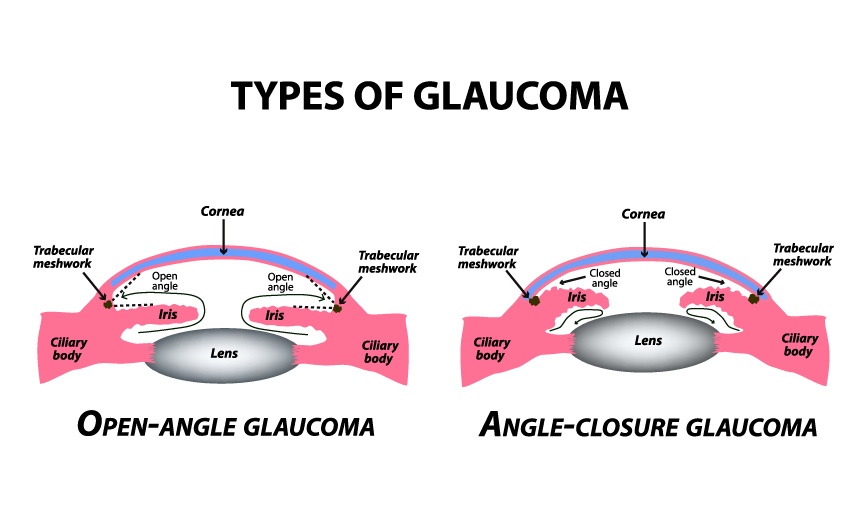Glaucoma
Glaucoma is the name given to several eye conditions involving the optic nerve (the nerve connecting your eye to your brain). This part of your eye is responsible for your peripheral vision. It is not an area of your vision you generally notice you are losing until it is too late and irreversible damage has been done. This could have an impact on your ability to hold a driver’s licence.
What causes Glaucoma?
Aqueous humor is a thin transparent fluid similar to plasma, this is constantly being made by your eye. This liquid holds the shape of your eye and keeps it in a pressurized state as well as nourishes it. At the same time, it is also draining from an area in your eye called the anterior chamber angle. If there is damage to the angle, drainage occurs slower than the eye is producing, and this results in an increase of intraocular pressure (IOP).

The main cause for Glaucoma is high intraocular pressure. The level of pressure required to damage your nerve varies from person to person but generally repeated pressure readings over 21mmhg is cause to investigate further. Then again, a patient with a high IOP could have perfectly healthy optic nerves, this is called ocular hypertension. While a patient with lower IOP readings could have a glaucoma called General Tension Glaucoma.
Glaucoma can be categorised into 2 types:
Closed Angle Glaucoma
It can occur for several reasons and results in a narrowing or blocking of the anterior chamber angle, this is an ophthalmic emergency and an appointment with an ophthalmologist should be sought immediately. You may experience severe pain that comes on suddenly, blurred vision, bright halos, eye tenderness and redness with a general feeling of nauseousness. Laser Peripheral Iridotomy is a painless procedure that can be performed straight away in the rooms to lower the pressure. However, surgery may be required later.
Open Angle Glaucoma
Is the more common of the two. In this case the drainage angle is as wide as should be however the trabecular meshwork or drainage canals are slowly clogged over time. This therefore results in a slow increase in IOP. People are unaware as they generally have no visual symptoms or pain. Treatment can be by using eye drops or by having a painless procedure called Selective Laser Trabeculoplasty in the rooms or surgery maybe required.
Am I at Risk?
You are more at risk of developing glaucoma if
- There is a family history of glaucoma
- Having certain medical conditions, such as diabetes, heart disease, high or low blood pressure
- Being over age 50
- Having had an eye injury or certain types of eye surgery
- Being extremely nearsighted or farsighted
- Taking cortisone (steroid) medications, especially eyedrops, for a long time
While there are no known ways to prevent glaucoma. Early detection, prompt treatment and regular monitoring to prevent further vision loss is very important. A healthy and active lifestyle will also help to lower your risk. Ensure you see your optometrist or ophthalmologist for regular dilated eye exams.
For a consultation, diagnosis and further advice on glaucoma, please contact us on (07) 3217 7399 to schedule an appointment.
